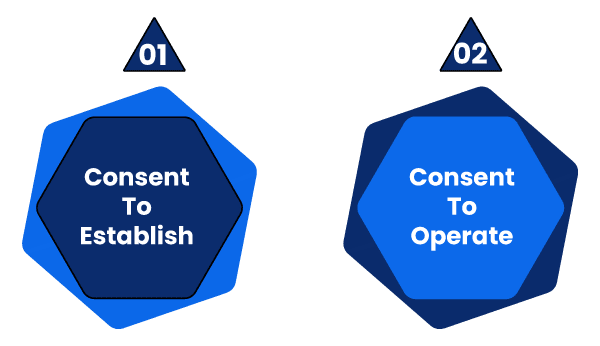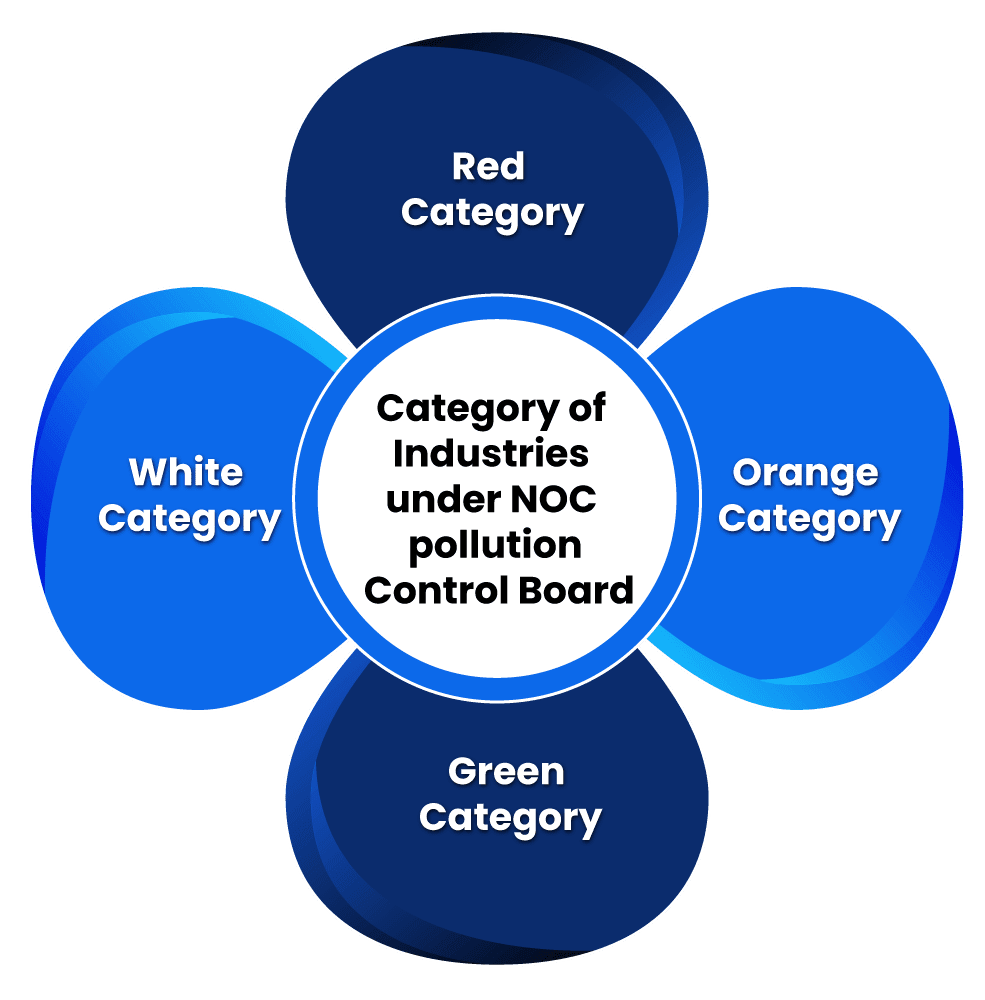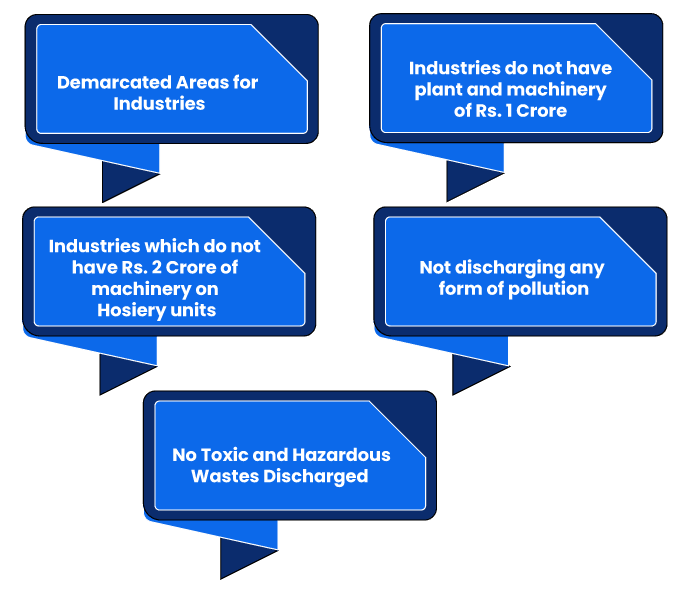NOC From Pollution Control Board
If you are planning on starting any business which could potentially generate pollutants such as chemical waste, detergent washing, fly ashes, smoke emissions (including cooking smoke), medical waste to name a few – also referred to as trade effluents, then you will need to make an application to the respective State Pollution Control Board and obtain a pollution license/Certificate or a consent to establish your business.
This consent to establish (let’s call it CTE) will have to be obtained prior to commencement of construction or any similar activities to start the business. Once the construction/ set up phase is complete, then you will have to apply and obtain a consent to operate (abbreviated as CTO). This CTO will usually be valid for a period of 5 years, which may vary State to State.
Every state board is the authority to secure this form of NOC Pollution Control Board. A manufacturer would require getting the Consent to Operate (CTO) and Consent to Establish (CTE). Once the consent period expires, it is essential to renew the Consent to Operate from the Pollution Control Board. Such consent is required in order to ensure that the institution or the industry is operating properly. Such consent would also ensure that the pollutants are not emitted as per the required amounts.
- Procedure of NOC pollution control board
- How to Get NOC from Pollution Control Board
- Documentation Required for Securing NOC pollution control Board
- Liaising with the Regulatory authority for Consent to Operate
Get your Pollution Clearance License in the fastest possible manner.
It usually takes 25 to 35 working days, depending upon government approval.
Pollution Clearance License
- Businesses looking to get Pollution Clearance License.
Preparation of Documents and filing with department
- Sheet Showing Information related to process flow
- Analysis report relating to solid waste, effluent, hazardous wastes and fuel gases
- Information on the instruments related to the concerned water control pollution board and the air control pollution board
- Quality Report of the Air Effluents
- No Objection Certificate
- Information related to Chemical Reactions
- Fee Related to Consent. A demand draft must be drawn in favour of the respective pollution control body
- Copy of the Environmental Clearance Certificate from the Government of India. This would only be required if the manufacturer is making the first consent to operate
- Calculations related to Water Budget
- Diagrammatic Representation of the Monitoring Facility
- Emission Analysis Reports
- Cess Applicable to the Water Industry if applicable.
Layout plan of the industry or the manufacturer and the sources related to effluent sewage treatment and emissions must be mentioned along with the layout plan
Pollution Clearance License made easy!
NOC Pollution Control Board- An Overview
CTO (Consent to Operate) is required for running an industry dealing with pollutants and hazardous wastes. Therefore it is crucial to renew the licence for consent to operate from NOC Pollution Control Board. There is a separate CTO for different forms of industries. Such industries would include the water and the air industry. Usually the requisite consent to operate from the NOC pollution control board is obtained under the Water Act, 1974 and Air Act, 1981. Apart from this the industry must comply with the rules related to authorisation under the Hazardous & Other Waste (Management & Transboundary Movement) Rules, 2016.
The manufacturer has to go to the requisite NOC pollution control board in order to secure this form of consent to operate. However, any form of manufacturing industry or any other commercial establishment would also require securing this consent to operate before starting operations.
If the above consent expires after a particular period of time, then the entrepreneur has to mandatorily file the renewal of the NOC pollution control board. Under different forms of environmental laws, Consent to Operate (CTO) is required for production and manufacturing activities. To secure consent to operate licence, the proprietor of the industry must submit the required permits with the fees and the CTO FORM.
Types of NOC Pollution Control Board
There are two forms of clearance as required by the requisite pollution control board

- Consent to Establish
Consent to Establish is known as the CTE. This form of consent is required from the authority in order to establish or carry out any manufacturing industries. This is something related to the primary permission from the requisite authority to operate any form of air/water or noise pollution industry.
- Consent to Operate
The second form of consent is known as the consent to operate (CTO). This consent would be required in order to ensure that the industry is maintaining standards related to operation. All industries require this form of consent to operate.
Main Functions of the Central Pollution Control Board (NOC Pollution Control Board)
The main functions of the Central Pollution Control Board:
- Ensuring and advising the government on matters related to air pollution, water pollution and sound pollution.
- Co-ordinating with the state pollution control body to ensure compliance is maintained.
- Providing and organising different forms of pollution control programs.
- Carrying out Research and Development Activities.
- Publication of Technical and Statistical Data.
- Implementing Schemes at a National Level.
Category of Industries under NOC pollution Control Board
The Central Environmental Protection Board and pollution control authorities have categorised different industries based on the amount of pollution. This categorisation would be under the applicable Water (Prevention & Control of Pollution) Act, 1974, Air (Prevention & Control of Pollution) Act, 1981.
The following category of industries would be classified:

If an industry is coming under the Red, Orange or Green Category then the requirement for Consent to Establish and Consent to Operate must be secured from the pollution control authorities under the Water (Prevention & Control of Pollution) Act, 1974, Air (Prevention & Control of Pollution) Act, 1981.
If an industry or manufacturer falls under the White Category then the requirement for securing the consent to operate and the consent to establish is not required. Hence manufacturers in these categories do not need to secure the CTO and the CTE under the respective environment pollution control acts.
An industry under the white category would have to just intimate the State Pollution Control Authorities. This would be the NOC from the state pollution control board.
Eligibility Criteria for Securing NOC Pollution Control Board
The following is the eligibility criterion which has to be sufficed by the applicant for securing the NOC from the Pollution Control Board:

Hence the applicant has to satisfy the above requirements and eligibility criteria in order to be compliant with the requirements of NOC pollution control board.
What Industries typically requires Pollution Consent?
See the list of industries that the Central Pollution Control Board has specified, as requiring a pollution license in the red, orange, green and white category. As the name suggests, the Red category industry has the highest pollution index, such as big manufacturing industries, large hotels, hospitals, etc. The orange category is a relatively medium-sized enterprise, which still generates comparatively high levels of pollutants. Whereas the Green category is the set of the industry with low pollution Index. And finally the white category, which is practically non-polluting.
Exempted Industries from Obtaining the Pollution Consent
Industries falling under the white category which is practically non-polluting does not need a pollution license/ or CTO. A simple intimation to concerned pollution control board about intention to set up such an industry/ business will suffice.
These White Category of industries has to however satisfy these condition to be eligible for this pollution license exemption:-
1. The industry is established/being established in the demarcated Industrial Estates/Zones classified by the State Authorities viz PSIEC, Department of Industries, PUDA, CTP under draft Master Plan or in mixed category area or predominantly Industrial areas within Municipal limit of a Town/City after classification of the area by CTP/STP/DTP.
2. The investment in the industry is not more than Rs. 1 Crore on plant and machinery.
3. There will not be any discharge of trade effluent from the industry into stream or well or sewer or onto land and/or that industry will not discharge any air pollution including noise into the atmosphere.
4. The industry will not discharge any toxic/hazardous wastes and will not handle any toxic/hazardous chemicals.
Documents Required for obtaining CTE (Consent to Establish) :
Every application for CTE shall be made in Form II in the case of any industry. This process has been moved online. You can refer to any state’s pollution control Board website. Here is an example of the State of Tamil Nadu.
Consent fee shall be paid Along with the application, depends on the category of the Industries with the following documents.
1. Copy of attested Sale Deed /Lease Deed or any other relevant documents as proof to ensure possession of the site/factory for which application is made by the applicant.
2. Copy of attested Memorandum of Articles in case of Public/Private sectors or registered partnership deed in case of the partnership company
3. Layout plan showing the location of various process equipments, utilities like boiler, generator etc, effluent treatment plant, outlet location, non-hazardous and hazardous waste storage yard.
4. Topo sketch showing the distance of water bodies, roads, existing/proposed residential areas, agricultural lands, important religious locations, educational institutions, ancient monuments, archeological places and other sensitive areas for 1 KM. radius from the units.
5. The detailed manufacturing process for each product along with a detailed process flow chart.
6. Details of Water Balance and wastewater balance for the process.
7. Details of Material balance for each product and process.
8. Land use classification certificate as obtained from CMDA/ DTCP/LPA.
9. Auditor’s Certificate with break up details for the proposed Gross fixed Assets duly certified by a Chartered Accountant in the prescribed format.
10. Consent fee under Water and Air Acts payable to the Board.
11. Groundwater clearance obtained from the competent Authority(If applicable).
12. Sewage Treatment Plant(STP) proposal which must contain details of design characteristics of sewage, treatment methodology, mode of disposal, design criteria for various units, detailed drawing of STP and its layout, a diagram showing the hydraulic profile and mode of disposal of treated sewage and its adequacy(If applicable).
13. Effluent Treatment Plant (ETP) proposal which must contain details including breakup quantity of water requirement with sources, breakup quantity of trade effluent, sources of trade effluent, characteristics of wastewater, treatment methodology, mode of disposal, design criteria for various units, detailed drawing of ETP and its layout, diagram showing the hydraulic profile and mode of disposal of treated effluent and its adequacy (If applicable).
14. Air pollution control (APC) measures proposal which must contain the details regarding fuels used, sources of emission, characteristics, concentration and quality of pollutant, proposal along with design criteria and drawing for the proposed APC measures, adequacy of APC measures and stack, odour/noise-causing operations and its specific odour/noise control measures(If applicable).
15. In the case of hazardous chemicals used as raw materials, the Material Safety Data Sheets (MSDS) should be enclosed for each and every item. If the quantity of the hazardous chemicals handled is more than the threshold limit, the unit shall furnish any one or combination of the following documents as required under the MSIHC Rules (If applicable).: Risk assessment report/Onsite emergency preparedness plan/Off-site emergency preparedness plan.
16. In the case of transport of hazardous chemicals, details of chemicals transported, method of transport and its safety measures (If applicable).
17. Industries attracting EIA Notification shall submit Environmental Clearance obtained from the MOEF/SEIAA along with the Environmental Impact Assessment Report (If applicable).
18. CRZ clearance obtained from the competent Authority (If applicable).
How to get NOC from Pollution Control Board?
- The process for securing NOC Pollution Control Board can be carried out through an Online Consent Management and Monitoring System (OCMMS). The link to the website is present below. http://ocmms.nic.in/OCMMS_NEW/index.jsp.
- Under Environmental Laws, Consent to Operate (CTO) is required for production. To secure consent to operate licence, the proprietor of the industry must submit the required permits with the fees and the CTO FORM.
Any applicant would have to secure NOC Pollution Control Board before staring operations. Even for the trail production, Consent to Operate is required. - An officer will inspect the industrial unit before giving the 1st
- After approval from the Competent Authority will check the status of pollution control measures/ devices undertaken at the time of obtaining the CTE as well as their structural adequacy before deciding the cases of first CTO under Water Act, 1974 / Air Act, 1981 and also authorisation under Hazardous Waste Management Rules
- After providing the first CTO, then within three months, another inspection of the sample will be carried out whether the industry is compliant with the Air and Water Pollution laws.
- If the industry is compliant after the sample test, then the licence will not be revoked.
- If the industry is not compliant, then the licence will be cancelled and revoked.
- Validity Period for Consent to Operation (CTO) under the Water Act 1974 and Air Act, 1981 will be as follows:
Industry/ Project Category | Validity Period |
Red Category | Five years |
Orange Category | Ten years |
Time Period for Paying Fee
Sl No | Category/Industry | Time Period | Time Schedule |
1 | Red | 05 years | For the First 03 years, at the time of filing of application and for the remaining 02 years before ending the 3rd year. |
2 | Orange | Ten years | For the First 04 years, at the time of filing of application, for the next 03 years before ending the 4th year and for the remaining 03 years before ending the 7th year. |
Consent to Operate for State Pollution Boards is different based on the requirement of the state board.
Penal Provisions related to Renewal of CTO under NOC Pollution Control Board
Sl No | No of days | Penalty Payment |
1 | 60 days before the expiry of consent to operate | 50% of Consent Fee originally applicable |
2 | 30 days before the expiry of the consent to operate | 100% of Consent Fee originally applicable |
3 | 0 days before the expiry of the consent to operate | 200% of the Consent Fee originally applicable |
4 | After expiry | 300% of the Consent Fee originally applicable |
Which Industries Mandatory Require CTO/CTE under NOC Pollution Control Board?
The following industries require CTO/CTE under the NOC Pollution Control Board:
- Manufacturing Industries
- Health Care Sectors and Institutions under Health Care
- Industries in the Sectors related E-Waste Management
- Solid Waste Management Industries
- Industries in Hazardous Waste Management
- Battery waste management entities
- Plastic waste management entities
- Bio-Medical waste management industries.
Period of Validity for NOC Pollution Control Board
The following period of validity would be applicable to the concerned category of the industries. The validity for the particular category of industry would only be applicable to the Consent to Operate (CTO). This would be applicable under the respective Water Act, 1974 and Air Act, 1981:
Sl No | Category of Industry | Validity Period for Consent to Operate |
1. | Red Category | 5 Year |
2. | Orange Category | 10 Years |
3. | Green Category | Usually this period would be about 7 to 15 years. This would depend on the state authority. |
What if you don’t obtain this Consent to Establish
Whoever contravenes the provisions of section 25 or section 26 shall be punishable with imprisonment for a term which shall not be less than one year and six months but which may extend to six years and with fine.
We hope this blog would have given a better understanding and guidance on getting a Pollution License/Certificate for business in India. But still, before proceeding with the above procedures, we recommend you to take proper consultation from corporate legal experts for a better understanding. And it’s our responsibility to abide by the pollution rules which safeguards our business as well as our environment.
FEE STRUCTURE

